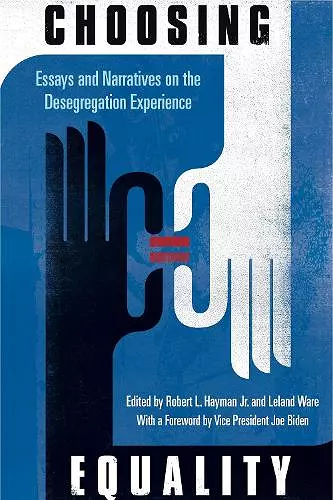Choosing Equality
Essays and Narratives on the Desegregation Experience
Leland Ware editor Robert L Hayman, Jr editor
Format:Paperback
Publisher:Pennsylvania State University Press
Published:15th Apr '11
Currently unavailable, and unfortunately no date known when it will be back
This paperback is available in another edition too:
- Hardback£68.95(9780271034331)

The Supreme Court’s decision in Brown v. Board of Education in 1954 has long been heralded as a landmark in the progress of civil rights in the United States. But as the forces opposing affirmative action and supporting resegregation have gained ground in recent years, its legacy has been questioned. Some wonder whether the decision did more harm than good, by fomenting a backlash, or whether the desegregation it brought about might not have been accomplished anyway through legislation. Others worry about the racial paternalism they see as inherent in the desegregation project and reflected in the Brown ruling.
Choosing Equality includes contributions that give voice to these concerns, yet it provides a strong challenge to this revisionist interpretation. It does so in a unique way, by positioning the issues in the overall national context but focusing on them in the experience of one state, Delaware, that stands as a microcosm of the larger conflict. The State’s significance to Brown lies in its contributing two of the five cases that were consolidated in the Court’s review of the litigation. But Delaware’s own history registered the racial conflict at the heart of the American dilemma: a slave state that fought on the side of the North in the Civil War, it experienced black migration to its cities and the ghettoization that followed but also had black farmers working as sharecroppers next to whites in its southern section. Moreover, while it saw massive resistance to desegregation, it also was the site of one of the largest and most peaceful metropolitan desegregation efforts.
This volume offers not only academic analyses of Delaware’s experience of Brown, set in the broader framework of the debate over its significance at the national level, but also the personal voices of many of the leading participants, from judges and lawyers down to community activists and the students who lived through this important era of the civil rights movement and saw how it changed their future by giving them hope.
“This splendid collection combines reminiscences and essays tightly focused on Delaware’s experience with segregation and desegregation with more general essays on the meaning of Brown v. Board of Education to provide readers with a well-rounded understanding of the experience of desegregation in Delaware and, as important, around the nation.”
—Mark Tushnet, William Nelson Cromwell Professor of Law, Harvard Law School
“This is an excellent collection of essays dealing with the impact of the Supreme Court’s historic 1954 opinion in Brown v. Board of Education. It is a must-read for anyone trying to understand the implications of the Brown decision for American society.”
—Kevin D. Brown, Maurer School of Law, Indiana University
“This collection of essays provides an interesting lens through which to examine Brown and its legacy, namely, the local situation in Delaware, particularly New Castle County and Wilmington. . . . Its unique local perspective offers an important lens for better understanding the national issues.”
—Paul R. Dimond, author of Beyond Busing (2005)
“In clear words, thorough research, and powerful arguments, Hayman and Ware—through their own voices and those of contributors, some of whom were the titans for justice—retell the road to Brown v. Board of Education. They do so through a deep exploration of Delaware’s untold story. Choosing Equality thus lays bare a northern state’s part in a personal, legal conversation for human dignity. Brown’s integration principle did not end this conversation. It continues today in the founding of charter schools and in Parents Involved in Community Schools. A truly important book, Choosing Equality is a must-read.”
—Reginald Leamon Robinson, Howard University School of Law
ISBN: 9780271034348
Dimensions: 229mm x 152mm x 29mm
Weight: 599g
406 pages